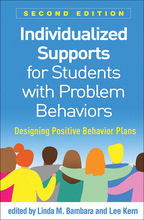Individualized Supports for Students with Problem Behaviors
Second Edition
Designing Positive Behavior Plans
Edited by Linda M. Bambara and Lee Kern
HardcoverPaperbacke-bookprint + e-book
Hardcover
orderMay 14, 2021
ISBN 9781462545834
Price: $92.00 470 Pages
Size: 6" x 9"
Paperback
orderMay 14, 2021
ISBN 9781462545810
Price: $61.00470 Pages
Size: 6" x 9"
e-book
orderApril 5, 2021
PDF and Accessible ePub ?
Price: $61.00 470 Pages
ePub is Global Certified Accessible
print + e-book $122.00 $73.20
orderPaperback + e-Book (PDF and Accessible ePub) ?
Price: 470 Pages
ePub is Global Certified Accessible
“Building on the first edition, special education luminaries Bambara and Kern provide updated practical guidance for school and allied professionals. Following an outstanding review of PBS foundations, comprehensive, step-by-step procedures are presented for PBS implementation, including integrative case examples and a range of relevant resources and tools. Without question, this book is a critical asset for school professionals and for students in university preservice training programs. I am grateful to Bambara, Kern, and their cast of national leaders for this important contribution.”

—Mark D. Weist, PhD, Department of Psychology, University of South Carolina
“Presenting recent advances in research and practice, the second edition of this work provides a practical, step-by-step framework for developing and implementing individualized behavior supports. The editors and contributors share their collective wisdom, expertise, and experience, using a collaborative, team-based approach and keeping the central focus of the process on the student and family. Readers are able to clearly see the underlying foundation, processes, and outcomes of PBS. Whether you are a teacher educator or are working in schools to support students with problem behaviors, this user-friendly guide should be an integral part of your toolkit! I recommend this book for classes dealing with functional behavioral assessment at either the graduate or undergraduate level.”

—Maureen A. Conroy, PhD, Anita Zucker Endowed Professor in Early Childhood Studies and Professor of Special Education, School Psychology, and Early Childhood Studies, University of Florida
“This second edition is a timely update on a critical topic. The book covers essential theoretical foundations of the PBS approach and expertly weaves in practical advice for addressing real-life situations. In a clear and engaging style, it explores important contemporary issues for educators and interventionists who seek to improve quality of life for individuals with challenging behaviors. Bambara, Kern, and their esteemed contributors bring the science to life with rich case examples. Like the first edition, this is an indispensable go-to text—I know I will use it whenever I teach students about designing effective positive behavior supports.”

—Grace Gengoux, PhD, BCBA-D, Department of Psychiatry and Behavioral Sciences, Stanford University School of Medicine
“Contributors emphasize an interdisciplinary, team-based approach to problem solving, making this book appealing to a broad readership, including inservice and preservice educators, school psychologists, and behavior analysts. This text would be great for use in a course on behavior intervention and assessment. Readers gain foundational knowledge on how individual supports fit into the broader context of multi-tiered systems, as well as how to systematically design and evaluate individualized behavior interventions. Case examples throughout the book are especially helpful. On a personal note, I particularly enjoyed the end-of-chapter commentaries from giants in the field. They are a great roadmap of where we’ve been and where we need to go to support some of our most vulnerable students by using positive, respectful, evidence-based, data-driven interventions.”

—Allison Bruhn, PhD, Scanlan Center for School Mental Health, University of Iowa
—Mark D. Weist, PhD, Department of Psychology, University of South Carolina
“Presenting recent advances in research and practice, the second edition of this work provides a practical, step-by-step framework for developing and implementing individualized behavior supports. The editors and contributors share their collective wisdom, expertise, and experience, using a collaborative, team-based approach and keeping the central focus of the process on the student and family. Readers are able to clearly see the underlying foundation, processes, and outcomes of PBS. Whether you are a teacher educator or are working in schools to support students with problem behaviors, this user-friendly guide should be an integral part of your toolkit! I recommend this book for classes dealing with functional behavioral assessment at either the graduate or undergraduate level.”
—Maureen A. Conroy, PhD, Anita Zucker Endowed Professor in Early Childhood Studies and Professor of Special Education, School Psychology, and Early Childhood Studies, University of Florida
“This second edition is a timely update on a critical topic. The book covers essential theoretical foundations of the PBS approach and expertly weaves in practical advice for addressing real-life situations. In a clear and engaging style, it explores important contemporary issues for educators and interventionists who seek to improve quality of life for individuals with challenging behaviors. Bambara, Kern, and their esteemed contributors bring the science to life with rich case examples. Like the first edition, this is an indispensable go-to text—I know I will use it whenever I teach students about designing effective positive behavior supports.”
—Grace Gengoux, PhD, BCBA-D, Department of Psychiatry and Behavioral Sciences, Stanford University School of Medicine
“Contributors emphasize an interdisciplinary, team-based approach to problem solving, making this book appealing to a broad readership, including inservice and preservice educators, school psychologists, and behavior analysts. This text would be great for use in a course on behavior intervention and assessment. Readers gain foundational knowledge on how individual supports fit into the broader context of multi-tiered systems, as well as how to systematically design and evaluate individualized behavior interventions. Case examples throughout the book are especially helpful. On a personal note, I particularly enjoyed the end-of-chapter commentaries from giants in the field. They are a great roadmap of where we’ve been and where we need to go to support some of our most vulnerable students by using positive, respectful, evidence-based, data-driven interventions.”
—Allison Bruhn, PhD, Scanlan Center for School Mental Health, University of Iowa



